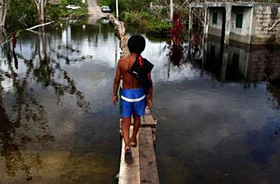 |
 |
 |
 News Around the Republic of Mexico | November 2005 News Around the Republic of Mexico | November 2005  
In Mexico, Mayan Homes Still Flooded, Crops Ruined
 Catherine Bremer - Reuters Catherine Bremer - Reuters


| | A Mexican Mayan man walks down an improvised walkway through floodwaters caused by Hurricane Wilma in the Yucatan town of Naranjal November 19, 2005. While Mexico sweats to repair storm damage to Cancun's luxury hotels and beaches, Maya Indians nearby have been left to fend for themselves as a lake of floodwater the color of black tea swallows their homes. (Reuters/Victor Ruiz) |
While Mexico sweats to repair storm damage to Cancun's luxury hotels and beaches, Maya Indians nearby have been left to fend for themselves as a lake of floodwater the color of black tea swallows their homes.

A rickety raised path built over the putrid water from old wood and cinder blocks is the only way in and out of the tiny farming hamlet of Naranjal, deep in the tropical forest inland from Cancun, since Hurricane Wilma tore through last month.

A dozen homes are flooded, some to thigh level, and the debris-filled lake -- 300 feet wide and stretching for several miles -- is growing as rainy weather continues and water seeps here from higher ground across the region.

Their drinking wells contaminated and the stagnant water causing fever and rashes, terrified residents are scrabbling to shift their tiny village, house by house, to higher ground.

"We thought the problem was over but it's getting worse. Instead of receding, the water is advancing a little bit every day. Basically, it's swallowing us up," said village councilor Gregorio Tun Cupul in front of his waterlogged home.

"The government says it is going to provide us with strong new houses -- I wish it was true. But we can't wait, we have to move the entire village before this gets worse."

Wilma, which hung over Mexico's Yucatan Peninsula for three days in October packing 145 mph (230 kph) winds, destroyed tens of thousands of homes and tore up some 2 million acres (800,000 hectares) of forest.

While repair efforts focus on Cancun, which is losing millions of dollars a day as hotels stand empty, Naranjal's 125 inhabitants are going hungry after Wilma flattened the maize and bean crops and killed off the honey and charcoal businesses that were the main source of cash.

"Our crops are completely gone. I don't know what we are going to live off," said maize farmer Donato Tun y Balam.

'We Need Water, Soap, Medicine'

Government officials and aid workers have visited Naranjal and other affected villages with food and drinking water and have promised to bring them cardboard roofing material.

Yet locals are skeptical the help will materialize.

"We need more water, we need soap, detergent, and medicine. They say 'yes' but nothing has arrived," said Tun Cupul.

Naranjal is typical of the isolated and impoverished villages where Maya Indians live today, a far cry from the breathtaking pyramid cities of their pre-Hispanic ancestors.

Proud of a scattering of Mayan ruins on the outskirts of the village, Naranjal has tried to get funding for a tourism project with bicycle tours to nearby sinkholes, but investment tends to focus on more lucrative projects on the coast.

The project is now on hold while the community races to build new homes from the dead wood strewn about by Wilma.

The move is a shock for 76-year-old Eleuterio Tun y Balam who has lived in the wood-and-thatch hut he built when he founded Naranjal half a century ago, after trekking through the forest seeking a patch of land to farm.

Wilma left his house in tatters and washed away everything inside, save an old mangy hammock hanging from the partially collapsed roof.

"Other storms came, but this one was the worst. My house has fallen down and the water will reach it soon," he said.

"Before Wilma hit people came from the town hall and told us to leave, but I would never go. I'm used to the quiet. This is home." | 
 | |
 |



